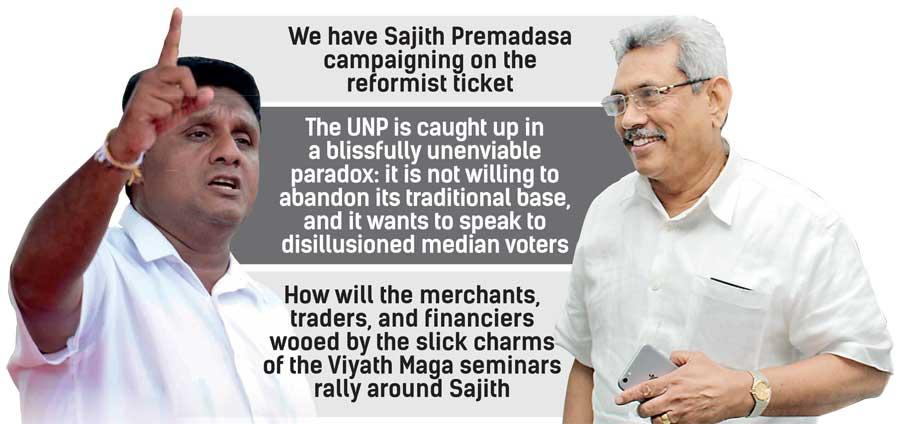Reply To:
Name - Reply Comment

The ball does not begin with Gotabaya and it does not end with Sajith. It did not begin the day Maithripala Sirisena crossed party lines and it did not end the day Ranil Wickremesinghe was appointed Prime Minister.
So it will not begin when Sajith triumphs over Gotabaya and it will not end when Gotabaya triumphs over Sajith and, according to the naysayers, ushers in a regime far more authoritarian than anything Mahinda, in his wildest dreams, can conjure. But then we must give both parties and personalities the benefit of the doubt. To assume one has already won the race is to  assume the electoral binaries and constellations are as they were in 2015: authoritarianism versus reformism. To contend there that reformism will triumph is to contend that the reformists are serious about toppling the authoritarians.
assume the electoral binaries and constellations are as they were in 2015: authoritarianism versus reformism. To contend there that reformism will triumph is to contend that the reformists are serious about toppling the authoritarians.
They are not. Ostensibly, we have Sajith Premadasa campaigning on the reformist ticket. But Sajith’s campaign is a continuation, if not a rehash, of the same combination of free market and social welfare policies (or Hayekian and Keynesian, as he crudely puts it) that his father stood for. It is also a repudiation of the neo-liberal policies associated with his erstwhile party contender, Ranil Wickremesinghe. A party that was in power for five years without much to talk about, let alone pride itself over, cannot be reformist unless it has jettisoned, from itself, elements and forces which prevented it from being the reformist outfit it was touted as being in 2015. These are the most rightwing, neo-liberal forces the UNP can muster up, part of the much derided Reid Avenue Royalist Regency. Sajith has not shown himself capable of doing away with them, much less staying a good league of two away from them.
In 2014, Maithripala Sirisena won on the strength of his promise that he would abolish the Executive Presidency and relinquish his powers to Ranil Wickremesinghe. Dayan Jayatilleka, who saw the absurdity of it, was spot on with his prognosis: “Why should anyone vote for Maithripala if he is not going to be the President after a hundred days while Ranil is going to be PM?” Elsewhere, much later, Qadri Ismail summed up Wickremesinghe’s major flaw: “he expects the Sirisenas of this country to beg for the vote, then step aside and leave him and his cronies the task of administration.” What more can you say about a man who’s lost close to 30 elections, I don’t know. Either way, we’ve gone back. Again. Wickremesinghe has asked Sajith to do another Maithripala, let him lead the UNP, and amend the Constitution as per a Parliamentary Select Committee that wants “reconciliation” (the TNA way?).
The UNP is caught up in a blissfully unenviable paradox: it is not willing to abandon its traditional base, and it wants to speak to disillusioned median voters. The median voter, and the floating voter, places far greater emphasis on issues of security and defence than he or she did back in 2014, and not just because of the Easter attacks. Although Gotabaya’s own party, the Pohottuwa, has done a U-Turn on the SOFA and MCC deals (which it lambasted, and is now revisiting and reassessing), the fact remains that the UNP administration is faulted more than anything else for lapses in defence. Sajith Premadasa has expressed opposition to any moves at compromising on sovereignty, but then he speaks for just one side of the UNP: the side that’s desperately trying to reform and remould itself.
The UNP has another side. It cannot abandon that other side. If it does, it will not get the support of minority parties all out for devolution and federalism (vis-a-vis Chelvanayakam’s “little now, more later” thesis) that goes well beyond Sajith’s ideal of “maximum devolution within a unitary framework.” The latter phrase itself is ambiguous, certainly open to scrutiny. What is maximum devolution? How can devolution coexist with a unitary state? And if they do, to what extent is co-existence possible? Even if these questions can be answered, it would seem the TNA is not happy: not too long ago, we heard it from Mr. Sumanthiran himself that Sajith was incapable of mustering the confidence of the people of the north. Mr. Sumanthiran speaks for these people; as such there’s no denying the veracity of what he says.
On the other hand it is not only the minority parties that have a beef with Sajith. The UNP, as I’ve pointed out before, is a party of merchants, traders and financiers. Nothing wrong there, except that Sajith has branded himself as a president of the poor, opening up one village after another while pledging that he will build more than 1,100 stupas. (All those, of course, with OUR money, something his fans and advocates don’t seem to realise.)
In the 2019 election the populist candidate is not Gotabaya Rajapaksa. It is Gotabaya’s opponent. How will the merchants, traders, and financiers wooed by the slick charms of the Viyath  Maga seminars rally around Sajith? The economic base of the UNP has typically been middle class, if not upper middle class: “Colombo,” Rosy Senanayake once aptly put it, “is our heart.” Colombo likes Ranil Wickremesinghe. It has not yet signalled it has endorsed or is ready to endorse Sajith Premadasa. In economics as in ethnicity, the candidate has hence unleashed confusion; he has split the UNP into two without showing how he will bring them together. It will take more than Hayek marrying Keynes to do that.
Maga seminars rally around Sajith? The economic base of the UNP has typically been middle class, if not upper middle class: “Colombo,” Rosy Senanayake once aptly put it, “is our heart.” Colombo likes Ranil Wickremesinghe. It has not yet signalled it has endorsed or is ready to endorse Sajith Premadasa. In economics as in ethnicity, the candidate has hence unleashed confusion; he has split the UNP into two without showing how he will bring them together. It will take more than Hayek marrying Keynes to do that.
The traditional UNPer will not vote for the man because he/she wants him. Yet again, 2019 has shown itself to be different to 2015. Without the UNP’s support, Maithripala Sirisena would have been nothing. They wanted Mahinda out, so they put Maithripala in. It was less a choice between two evils than between two polar opposites: authoritarianism versus reformism. No such dichotomy exists in 2019, owing to the disconnect between the people and their political representatives (over last year’s October coup and this year’s Easter attacks), which means that as far as the traditional UNPer is concerned, she/he will have to eat humble pie even when voting against Rajapaksa: she/he doesn’t like Sajith (because, of course, he’s a demagogue), and she/he doesn’t know what he will do (to Ranil and his Regency) once he gets power, but she/he has to choose between a rock and a hard place, and she/he prefers the rock.
Politics makes strange bedfellows. The UNP’s candidate, who speaks for a reassessment of constitutional reforms, is surrounded by MPs who went gung-ho over constitutional reforms before. He is surrounded by MPs who have consistently facilitated the subsidisation of capital interests, during and prior to this regime. He is surrounded by political orphans who shouted “Lasantha!” and are now claiming at public rallies that Lasantha Wickremetunga didn’t think he would be killed. He is surrounded by the corrupt and the tawdry who are against him but who want a piece of the pie from him should he win. And of course, he is surrounded by the most vociferous exponents of neo-liberal theory, though he has said the end of neo-liberalism, in Sri Lanka, has come. Not even Gotabaya Rajapaksa can match him for the contradictions, conundrums, and paradoxes he has let himself into.
Perhaps all this is wishful thinking, and perhaps it is. Perhaps the man does not believe what he is saying and, worse, perhaps he intends to backtrack on everything he has promised. If so, one can ask why those who were against Maithripala Sirisena partnering with Ranil against Mahinda have gone quiet over Sajith doing the same against Gotabaya. One can ask why one should vote for a populist under whose regime many of those old, detestable faces will return, to rule and to roost and to loot. If the premise for Sajith’s candidacy is the explicit repudiation of those old faces, that is all it will take for him to give Gotabaya a good run for his campaign money; unfortunately, his own campaign, as with his rhetoric, is confused; you cannot square a man who speaks for the sane and rational with a man who wants to go on building stupas. No one, not even the fervent Buddhist in me, can do that.
What we have here are two candidates who want to depart from the policies that characterise this regime. We have Gotabaya Rajapaksa, who wants to take us back to the way things were before 2015, and we have Sajith Premadasa, who wants to take us back to his father’s era while continuing the reformist project that Maithripala backed and Ranil hacked. (We know now that it didn’t take long for that to be hacked: weeks after January 2015, Ranil had sworn in Arjuna Mahendran as Central Bank Governor.) The problem is that Sajith makes it out he’s a good league away from the Reid Avenue Regency which had a hand in the Central Bank controversy, while also being a member of that club; that remains his biggest problem. He can fight for victory only after he resolves it. As of now, he has not.
So no, 2019 is not 2014. An awful lot of people think it is. But it is not.